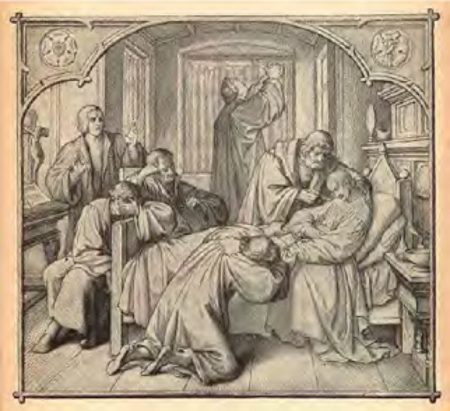
“How should I pray effectively?” asked Peter Beskendorf centuries ago. Peter was a friend of Martin Luther – the Great Reformer’s barber. Luther responded with a little booklet, published in 1535. “How one should pray,” he called it helpfully.
Over the past two months we have been looking at the simple counsel described in this booklet. If you want to pray effectively, Luther advised, use the Bible, beware the devil, make a plan, and apply a bit of discipline.
This month we offer an additional insight from the Reformer’s simple counsel. Luther recommended that his good friend learn to “pray twice.”
First and foremost, Luther advised his friend to get into “the habit of true [disciplined] prayer.” He envisioned setting aside some moments every day for dedicated and attentive prayer, following the sort of “four-strand” discipline we presented last month. Straightaway in the morning, before any other business, we should pray in this way. “We must be careful not to break the habit of true prayer and imagine other works to be necessary which, after all, are nothing of the kind.”
This is our “first” prayer: here we should always begin our day. But then we should pray again.
Luther recalls a saying attributed to St. Jerome: “He who works faithfully prays twice.” Everything a believer does is prayer, according to Jerome. “This can be said,” Luther explained, “because a believer fears and honors God in his work and remembers the commandment[s]…. Such thoughts and such faith undoubtedly transform his work into prayer and a sacrifice of praise.” A believer prays throughout the day.
A believer does not have to “go into a room and lock [himself] in” in order to pray, Luther reminds us in similar passage. “A Christian always has the Spirit of supplication with him, and his heart is continually sending forth sighs and petitions to God, regardless of whether he happens to be eating or drinking or working.” (WLS, 3453)
A believer does not need to bow his head or lift his hands in order to pray. Luther finds nothing wrong with bowing one’s head! Yet prayer “is not ill done if one who is binding sheaves in the field or lying on a bed prays with the heart alone.” (WLS, 3474)
A believer does not need a book of liturgy in order to pray; scripted prayers can become mere “twaddle,” Luther warns. A believer may pray with “a word or two,” anytime and anywhere,”in the midst of reading, writing, or doing some other task.” (WLS, 3464)
Luther insisted that our entire Christian life “is devoted to spreading the name of God, His glory, and His kingdom.” Whatever we do “has to be subordinated to this.” (WLS, 3453) Working and eating have to fit in. Reading and writing, too. Because of the overarching mission of God, every venue and every activity throughout the day can become a venue for prayer.
So St. Jerome was much too reserved: Christians will pray more than twice. When we’re off to work, we will plead for the advance of God’s kingdom in our workplace. When we go to school, we will pray for God’s glory there. When we return again home, we will plead for the advance of God’s grace in our home life. And when we remember an unbelieving neighbor – or come to know an unreached people group – we will sigh and intercede for a work of God’s grace among them, as well.
This is a concern that cannot be limited to an hour of prayers on Sunday mornings; it is simply too big. It turns out that believing barbers like Peter Beskendorf have bigger horizons and broader concerns than can be contained in a Sunday morning. They are praying continuously. And their barbering fits – it is “subordinated” – in the wonderful and compelling task of spreading the name of God among the nations.